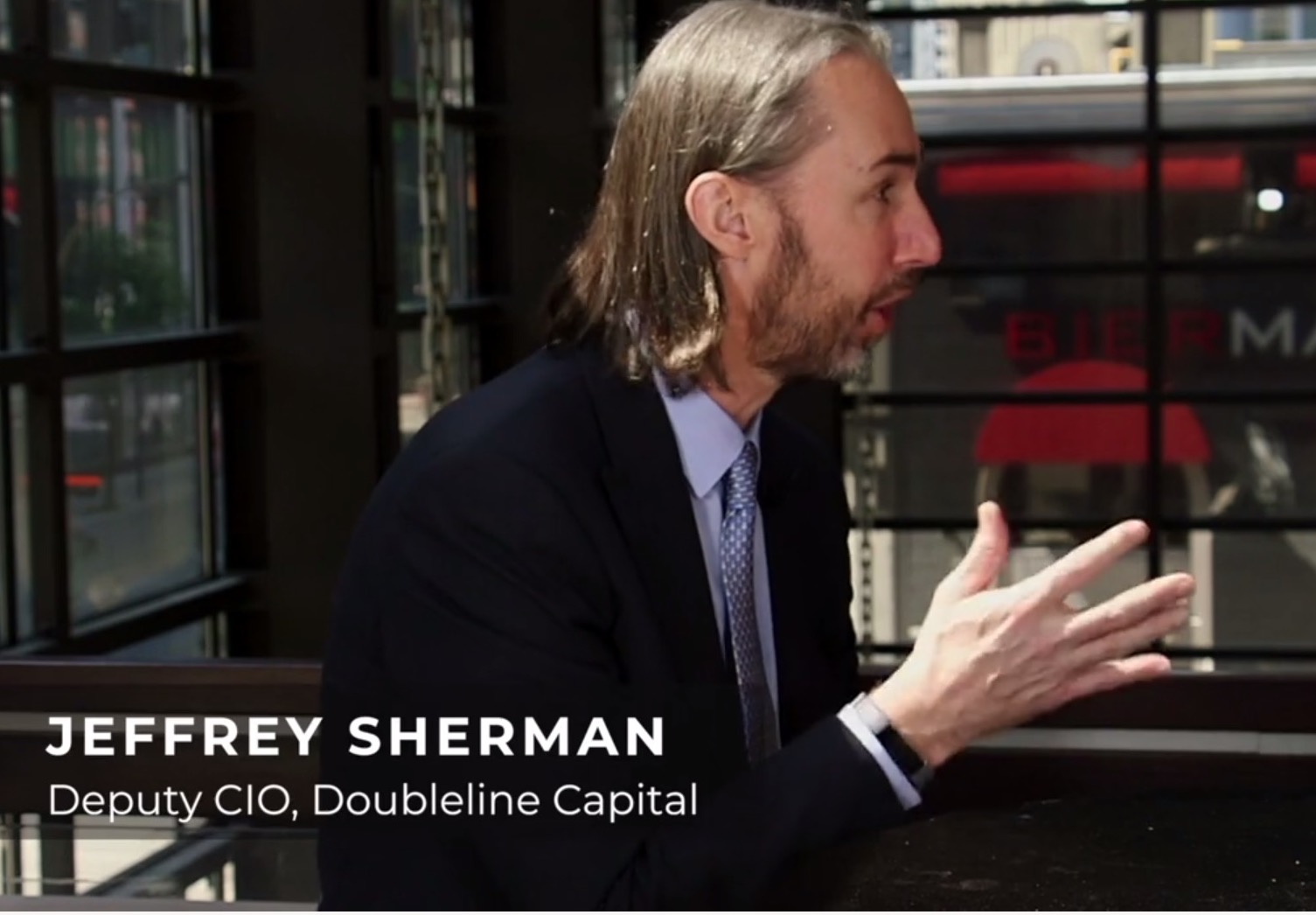Our in-depth conversation with Doubleline Capital's Jeffrey Sherman at the InsideETFs Canada conference, June 18-19, 2019. We discuss the bond and equity market's signals, and talk about his investment strategy. Sherman also weighs in on whether we are, or are not, in a bear market?
Full transcript:
Pierre Daillie: Joining us right now is Jeffrey Sherman co-CIO from DoubleLine Capital.
Jeffrey, thanks so much for joining us it's great to be here with you.
Jeffrey Sherman: Thanks for having me today.
So Jeffrey, we're late in the cycle the Fed has pivoted, that's old news, they've gone dovish today is a big decision day and the bond market has been pricing in a slowdown or recession.
PD: First of all do you think the bond market is correct in pricing in a recession?
JS: Well that's the big question here at this point. I think when you look at where yields are today it's not just the U.S., it's really the global slowdown.
And so what you've seen is bond yields rally across the world really for the last let's call it you know nine nine months or so really start in the fourth quarter.
If you look pricing of the yield curve in the US, what it's saying is effectively the Fed needs to cut rates.
That's all up to debate on what that timing is on the Fed cut.
You mentioned that today the Fed starts to meet today, the decision gets announced tomorrow, and the markets not really pricing in a cut for tomorrow and it's a tough position for Mr. Powell to be in, being the Chairman.
The bond market is putting on this pressure and saying that you should you should cut rates, but, I think that Mr. Powell is going to try to be data dependent.
He's going to talk about having the tools available. What you saw today is Mario Draghi, the head of the ECB, come out and say all those things once again, and so what you've got is another kind of another set of momentum behind the bond rally.
It hasn't moved significantly in the US, but, now you have the market in the euro zone pricing to cut again.
So, you say recession – I don't say the bond markets priced in a full recession yet.
Right but that slowdown is there – that's undeniable – there's mixed sets of data out there today, and so when you look across the spectrum you can take certain data points and argue, "well growth is still there," and you can take other data puts and argue that on the precipice of a recession.
So as a mixed bag I think it's a little too early to say we're in the recession but we have the chance of slipping into one maybe the next six to nine months or so.
PD: So now at Doubleline you run the multi-asset and derivatives strategies – what is your outlook for the next year or two?
JS: yeah well it's going to be a challenging environment and I think that again, we've been so dependent on Fed policy ECB policy that it's kind of like a lot of the macro went out the window for many years.
And now when things start to slow down, everybody's looking for the central banks to save us, effectively.
So, you've got to cut rates, and I don't think that a 25 basis one or 50 basis point cut is going to save the world, but it's pretty much it's showing that the market is saying that the Fed policy is too tight right now.
The question is does it stoke the inflation argument?
I don't think so and so I think you know it's too early to position for the recession.
I think what you need to do is have a balance in your portfolio today. That's kind of a cheesy thing for people to say, but I think it's more important than ever, because there is the risk to the upside in growth, right, because everybody's pricing this momentum and the momentum has been very negative.
So what you want to do is say "What if things turn around?"
You don't want to be fully positioned for the recession but I think you've got to start thinking about you know what can help you if if indeed we are having this global recession. It's tough to say right now, whether or not you really want to make dramatic changes because where are we sitting today well rates have rallied, credit spreads have tightened, and equity markets in the US are up.
It's not like things are extremely cheap to position for these things so I think it's more important than ever to kind of have a balanced mix, and you probably want to tilt towards one of these other views.
I would say if anything that's the cheaper side of the equation its pricing for the growth side of the equation.
We'll have to wait and see.
Watching German bunds and their ten-year yield go more negative each day it doesn't set up for a good environment right now because essentially they're going to destroy their banking system by just forcing their banks to to earn these negative yields over and over, essentially bleeding money out.
PD: Both you and the other Jeffrey, Jeffrey Gundlach, you've both recently talked about that we're in a bear market.
Are we in a bear market?
JS: Well I mean stocks are struggling to set new highs. If you look at the global equity market I'd say it's close to a bear market, it's definitely not setting new highs and our peaked back in January of 2018. It's really tough to say that you're in this strong bull market globally.
So the S&P 500, the US equity markets, the Nasdaq – what you've seen there is that they've had very strong performance.
There was a big tax plan in the US here that helped both corporate and individuals, but we have a new...
PD: Would you say its been successful?
JS: Well I mean, it's short term successful. If you if you use the equity markets barometer as as some of our leaders in the US have done, ...
But, you know the thing is is that leadership is changed recently. Right, if you take a look at it the things and the things that were the darlings of the stock market have suffered.
So if you're gonna be in a bull market you need either the former leadership to get back to highs or you actually need a new set of leadership and really when you look across the US economy it's hard to ascertain what that new sector would.
PD: So how do you how do you get around the concern of not knowing exactly what the next leaders are gonna be?
JS: You always have that right.
I mean by definition, we don't, we're not clairvoyant – no one really is.
PD: How do you do it?
JS: Well so I mean the way we run on our equity strategy, we run systematic.
We believe in the process. We run a sector rotation strategy that's predicated upon the research of Professor Robert Shiller, from Yale.
We apply his CAPE ratio to sectors of the market, and try to systematically find what we believe are the cheaper sectors of the market.
So, that's one way we follow a systematic process that has been successful since we've launched it it's been a little over five and a half years and it's been able to outperform
PD: You're doing really well.
JS: That's done quite well we've been able to outperform the S&P 500, so there's something to be said about having different types of strategies versus being outright stock pickers, which I'm not.
From that perspective, I learned it a long time ago early my career that I'm not good at picking stocks so I shouldn't try to do it.
I'm more of a mathematician than a finance and accounting major, so from the standpoint of trying to allocate capital, it's to be prudent, right.
Don't chase. Momentum has paid you for a long time.
Momentum just being an index fund for instance, right.
So perhaps at this point the cycle it's time for counter-trend; maybe value makes a comeback.
People have been saying that for many years.
I don't think value is dead but you know that they're...
PD: This is a very challenging market for value it's been really a momentum led market.
JS: Right but we know that typically those things change in cycles, no one can ever call the end of it, and so you just have to be patient.
If you don't like the way your pour flows are performing I like to always say is that then you probably have too much risk.
And if you have too much risk you you can do something about it.
And like I said at the onset we've had highs in stock market prices, we've had credit spreads tighten, we've had yields rally. You have a chance to resculpt. If you didn't like what happened in the fourth quarter,
PD: This is it.
JS: This is a time to be able to do it.
Look you may be early you may be wrong a little bit but if you didn't like the drawdown and you stayed in the market or you got back in, you have a good chance to resculpt, and that's the whole idea.
PD: Some folks have said this is a sellable rally, this is an opportunity to pare back, or rebalance.
JS: Right and I think all eyes are on the Fed at this point and how how does it have this Jerome Powell navigate it tomorrow.
It's going to be very careful.
We've been talking about at Doubleline, what we said is that
PD: ...Yeah how is he gonna finesse it?
JS: well I think the thing is is that Powell definitely wants to get out of there as soon as possible. You may see one of the shortest statements that's ever been written; his prepared remarks may be the shortest and he's not gonna get out.
Maybe he'll say oh someone's given a phone call in the middle of a it's got to be taken out, I mean.
We just don't think it's gonna be drawn out. The more he talks the more danger it is because it's like an interrogation.
The longer you talk, the more you may say something that someone doesn't like, and that's what we do, because we're so, we've been so dependent upon the Fed for so long, and the ECB, and the BOJ, to provide the outs and the support to markets, that we hang on to every word to say oh is there something different than policy, but I think at this stage you mentioned the pivot when we started. They pivoted to from being a hiking regime to at least a pausing regime, the market thinks that turns into a dovish regime, or of cutting regime, and so I think that that's gonna ultimately happen.
I think that Powell doesn't want to be perceived as being you know slammed by President Trump which Trump came out today.
I'm back at the Draghi comments and President Trump said you know look the ECB's cheating – they're devaluing their currencies, or these stimulus measures and and we need to get with it – effectively that's what he's doing. so I think there's incentive for Powell to want to wait.
If he is data dependent you know you can point to posities, he can point to negatives.
But if you look at their dual mandate they're delivering on unemployment, the inflation measure HAS been missing. If you use their reported measure that they look at which is this core PCE or personal consumption expenditure.
When you look at a lot of the other core inflation measures they're not strong but they're around that 2% number, so the Fed can dance.
That's one thing we've learned. They can change they can change their targets.
They had a meeting a couple weeks ago where they were talking about changing perhaps policies. It's not some systematic thing.
It's not just some algorithm that they follow.
They create models through time and some work some don't.
I think that their flexibility is something that's important at this stage but I don't think it's going to be a game changer.
PD: Yeah, do you think ... are there any 800-pound gorillas in the room, like any risks that are unforeseen that you see, or anything that you're concerned about?
JS: Well I think and we've been saying for a couple years of DoubleLine that we think that the corporate bond market is just too big.
It's too big, and I'm talking about the US. The corporate bond market, especially the investment-grade side, has doubled in size since the financial crisis; it has higher leverage ratios than ever, especially for a given credit rating.
Right and what you find are spreads are tight. And people look at indices or look at the broad market say well spreads have been tighter historically but if you adjust for some of these leverage ratios and kind of the risk to them on that side of the bond market, spreads are not as tight as they would be perceived from just looking naively at a chart.
But this isn't unknown to the market. It's something that a lot of houses have been writing about this year.
And so I don't think it's an unknown risk but I think some investors just ignore it and say "oh well the ratings agencies have rated them the best so they must be.
PD: The default rates too low...
JS: But when the defaults rate is low it doesn't go seemingly lower.
So you have to still price in the ability of there being defaults, and I don't think that the corporate bond market goes to this big default which causes a recession.
I think it's the other way around, right?
That the recession could lead into it slow down, you get a curtailment the consumer in the US, and you could have some problems.
But you know, the consumer data retail sales picked up again the last print.
It's volatile in that on the macro front, and volatility is just going to be that hopefully that creates some trading opportunities there.
I don't think it's an unknown risk at this point. People thought we were crazy when we were talking about it you know roughly three years ago, but that's the idea is to try to get in front of it, right.
You look foolish for a while, spreads continue to tighten in, but if you think about when we were talking about that in 2016, we just went through kind of this profit recession in the US – it was led by the energy sector the commodity producers – and it looked like we're gonna have a global slowdown.
Then we got through it, we muddled through it, and now here we are again and everybody's looking for fire power somewhere.
I'm just not convinced that just it rate cuts are the things that are going to be stimulative enough to get us through.
At this point like I said you have a chance to resculpt if you're not comfortable with what that risk in the marketplace
PD: So Jeffrey going back now, when did you know that that you wanted it to be in this business? Looking at your bio, you know, you studied math, you you have graduate degrees in math and sciences, and when did you first know, what made you decide to get into the business?
JS: Yeah I mean when I went to graduate school and I was I was doing a Ph.D. program in applied math, as you said, and I couldn't really find the application I liked.
I wasn't into the physics, just never really interested me.
I was doing statistics and things like that because it was the alternative and then I stumbled across the finance side where you know the finance world was trying to you know – the way the economists had physics envy – you know that they were trying to model all these things out, and some of it can be modeled, but you have to understand that you know the model doesn't tell you everything.
There is psychology there's a lot of behavioural aspects, and you know, it's just the psychosis of a market.
And so you know I decided to apply the finance side to the matter from the math degree to the finance side, and I just started working the business. I got in, and figured you know, you're young enough that if you don't like it you can always rescuplt and retain just like a portfolio.
So you know it's something that I was very interested in and did a lot of reading; did a lot of things across multi-sectors, and not just focusing on one area, but just trying to understand how the big picture all works together.
I feel like I'm still learning right, like all of us.
You know look there's no textbook on negative interest rates, at least not to my knowledge yet, and you know policies of negative rates.
I mean when I read the Fabozzi book, 'the handbook of fixed income,' which is the de facto guide for bond investors, there was nothing there talking about the zero lower bound, or the duration is capped by the that.
All of a sudden now you've got to rethink these things.
I'm sure Dr. Fabozzi is all over that and you know gonna get a new edition out.
There's always new challenges to markets and that's what I find interesting, is that, it's always problem-solving, it's a puzzle, and you know no market is unique, but there's a lot of similarities.
I think the thing that I would advise folks that want to do this, you also have to study history, but you got to study history, but the problem with studying history is that you look at it in a spreadsheet or you look at it from not being in the market.
So what you what you miss from that, that's, that it's impossible to really figure out is, "What was the psychology of the market at that time?", and I think if you can figure that part out, you can understand why there were these big draw downs, or you know how markets got over value, how you had bubbles in both directions right to the growth side and pretty massive depressionnary side.
It's trying to apply all these things together that I found very interesting early on, and I still do today.
PD: Fascinating.
Jeffrey, thank you so much.
JS: Thanks for hosting me today
About Jeffrey Sherman
As DoubleLine’s Deputy Chief Investment Officer, Jeffrey Sherman oversees and administers DoubleLine’s Investment Management sub-committee coordinating and implementing policies and processes across the investment teams. He also serves as lead portfolio manager for multi-sector and derivative-based strategies. He is a member of DoubleLine’s Executive Management and Fixed Income Asset Allocation Committees. He can be heard regularly on his podcast “The Sherman Show” (@ShermanShowPod) where he interviews distinguished guests, giving listeners insight into DoubleLine’s current views. In 2018, Money Management Executive named Jeffrey Sherman as one of “10 Fund Managers to Watch” in their yearly special report. Prior to joining DoubleLine in 2009, he was a Senior Vice President at TCW where he worked as a portfolio manager and quantitative analyst focused on fixed income and real-asset portfolios. Mr. Sherman was a statistics and mathematics instructor at both the University of the Pacific and Florida State University. He taught Quantitative Methods for Level I candidates in the CFA LA/USC Review Program for many years. He holds a BS in Applied Mathematics from the University of the Pacific and an MS in Financial Engineering from the Claremont Graduate University. He is a CFA charterholder.
Copyright © AdvisorAnalyst.com













